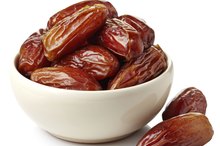What does fact checked mean?
At Healthfully, we strive to deliver objective content that is accurate and up-to-date. Our team periodically reviews articles in order to ensure content quality. The sources cited below consist of evidence from peer-reviewed journals, prominent medical organizations, academic associations, and government data.
- Journal of Food Science: Raisin Consumption by Humans: Effects on Glycemia and Insulinemia and Cardiovascular Risk Factors
- Journal of Food Science: Raisin Consumption by Humans: Effects on Glycemia and Insulinemia and Cardiovascular Risk Factors
- American Heart Association: Potassium and High Blood Pressure
- American Heart Association: What Is High Blood Pressure?
- American Heart Association: Obesity Information
The information contained on this site is for informational purposes only, and should not be used as a substitute for the advice of a professional health care provider. Please check with the appropriate physician regarding health questions and concerns. Although we strive to deliver accurate and up-to-date information, no guarantee to that effect is made.
Are Raisins Good for Cholesterol?
Raisins are a naturally sweet way to help lower your cholesterol and keep it normal. Raisins contain both soluble and insoluble fiber, potassium and antioxidants — all of which may benefit your heart. Raisins contain natural sugar, and you can eat them alone, as a topping or as a chewy addition to many dishes.
Fiber and Cholesterol
Researchers of a study published in "Metabolism: Clinical and Experimental" in 2009 found that when people consumed 1 cup of raisins daily and also walked, they lowered their low-density lipoprotein, or "bad" cholesterol 1.
Raisins contain both insoluble fiber, which helps you stay regular, and viscous soluble fiber, which lowers cholesterol. One cup of raisins contains a little over 6 grams of fiber. You may not need to eat an entire cup every day; instead, use raisins to increase your daily fiber intake.
- Researchers of a study published in "Metabolism: Clinical and Experimental" in 2009 found that when people consumed 1 cup of raisins daily and also walked, they lowered their low-density lipoprotein, or "bad" cholesterol 1.
- Raisins contain both insoluble fiber, which helps you stay regular, and viscous soluble fiber, which lowers cholesterol.
Potassium for Blood Pressure
Are Tamari Almonds Good for Cholesterol?
Learn More
According to the American Heart Association, healthy adults should consume 4,700 milligrams of potassium daily because potassium helps regulate your fluid balance and blood pressure 457.
High blood pressure can increase your risk of high cholesterol 5. High blood pressure leads to the stretching of your blood vessels and artery walls 4. Lots of stretching can cause tiny rips in the walls of your blood vessels and arteries, leading to scar tissue. Cholesterol can then get caught in the scar tissue crevices, resulting in high cholesterol.
Raisins are a rich source of potassium, with almost 310 milligrams in just 1/4 cup. Adding raisins to your diet may help increase your potassium to control your blood pressure, as one 12-week clinical trial published in the "Journal of Food Science" in 2013 showed. This effect may indirectly prevent or lower high cholesterol.
- According to the American Heart Association, healthy adults should consume 4,700 milligrams of potassium daily because potassium helps regulate your fluid balance and blood pressure 4.
- Adding raisins to your diet may help increase your potassium to control your blood pressure, as one 12-week clinical trial published in the "Journal of Food Science" in 2013 showed.
Antioxidants in Action
Raisins contain a wide variety of phytochemicals and antioxidants, which are beneficial to health, as indicated by 2017 research in "Food and Nutrition Research." Antioxidants are anti-inflammatory — they help naturally widen your blood vessel and artery walls, and this may decrease your risk for high cholesterol. The researchers of the 2013 "Journal of Food Science" study found that eating raisins decreased inflammation.
Patients had a reduction in LDL cholesterol that had already been oxidized — stored in vessel walls and increasing the risk of further cholesterol buildup. The raisin eaters also experienced a reduction in total cholesterol.
- Raisins contain a wide variety of phytochemicals and antioxidants, which are beneficial to health, as indicated by 2017 research in "Food and Nutrition Research."
Preventing Weight Gain
Nutrition in Chocolate-Covered Raisins
Learn More
The American Heart Association defines obesity in terms of a body mass index above 30 and says the condition can lead to high cholesterol 457. Many clinical researchers who have studied the effects of raisins in the diet agree that this food, when combined with a healthy diet, can prevent weight gain because the fiber in raisins increases your satiety or feeling of fullness, which means you'll eat less.
Related Articles
References
- Metabolism: Clinical and Experimental: Raisins and Walking Alter Appetite Hormones and Plasma Lipids by Modifications in Lipoprotein Metabolism and Up-Regulation of the Low-Density Lipoprotein Receptor
- Journal of Food Science: Raisin Consumption by Humans: Effects on Glycemia and Insulinemia and Cardiovascular Risk Factors
- Journal of Medicinal Food: A Review of Dietary Fiber and Health: Focus on Raisins
- American Heart Association: Potassium and High Blood Pressure
- American Heart Association: What Is High Blood Pressure?
- USDA National Nutrient Database: Raisins, Seedless
- American Heart Association: Obesity Information
- Raisins, dark, seedless. FoodData Central. U.S. Department of Agriculture. Published April 1, 2019.
- Grapes, american type (slip skin), raw. FoodData Central. U.S. Department of Agriculture. Published April 1, 2019.
- Fulgoni VL, Painter J, Carughi A. Association of raisin consumption with nutrient intake, diet quality, and health risk factors in US adults: National Health and Nutrition Examination Survey 2001-2012. Food Nutr Res. 2017;61(1):1378567. doi:10.1080/16546628.2017.1378567
- Painter JE, Waters AR. A review of the health benefits of raisins. J Food Sci. 2013;78 Suppl 1:ii-iii. doi:10.1111/1750-3841.12139
- Bell SJ. A review of dietary fiber and health: Focus on raisins. J Med Food. 2011;14(9):877-83. doi:10.1089/jmf.2010.0215
- Rietschier HL, Henagan TM, Earnest CP, Baker BL, Cortez CC, Stewart LK. Sun-dried raisins are a cost-effective alternative to Sports Jelly Beans in prolonged cycling. J Strength Cond Res. 2011;25(11):3150-6. doi:10.1519/JSC.0b013e31820f5089
- Wong A, Young DA, Emmanouil DE, Wong LM, Waters AR, Booth MT. Raisins and oral health. J Food Sci. 2013;78 Suppl 1:A26-9. doi:/10.1111/1750-3841.12152
- Chibuluzo S, Pitt T. Raisin allergy in an 8 year old patient. Allergy Asthma Clin Immunol. 2014;10(Suppl 2):A6. doi:10.1186/1710-1492-10-S2-A6
- Dreher ML. Whole fruits and fruit fiber emerging health effects. Nutrients. 2018;10(12):1833. doi:10.3390/nu10121833
Writer Bio
Jamie Yacoub is a clinical outpatient Registered Dietitian, expert in nutrition and author of her cookbook "Modern Guide to Food and Eating: Low Glycemic Recipes". She obtained a Bachelor of Science in clinical nutrition from UC Davis and an MPH in nutrition from Loma Linda University. Yacoub then completed her dietetic internship as an intern for a Certified Specialist in sports nutrition and at a top-100 hospital.









